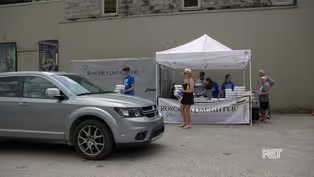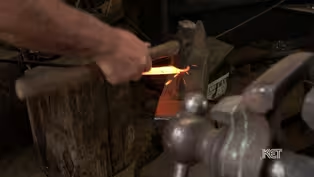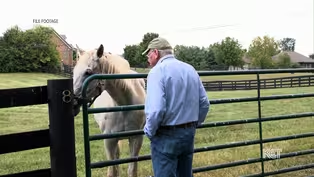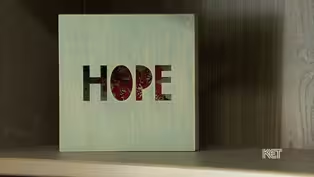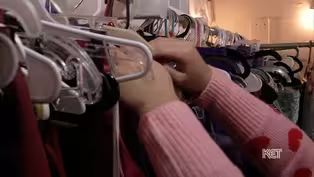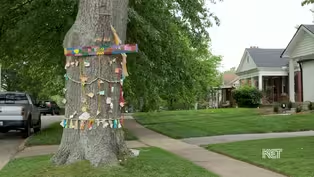
Re-Entry Simulation
Clip: Season 2 Episode 126 | 3m 1sVideo has Closed Captions
After years of offering second chance employment, Rob Perez of DV8 Kitchen says he ...
After years of offering second chance employment, Rob Perez of DV8 Kitchen says he thought he knew it all when it came to the challenges faced by those re-entering society after addiction or incarceration. But a re-entry simulation by the Kentucky Department of Corrections opened his eyes. Now, he's helping educate others about the hardships.
Problems playing video? | Closed Captioning Feedback
Problems playing video? | Closed Captioning Feedback
Kentucky Edition is a local public television program presented by KET

Re-Entry Simulation
Clip: Season 2 Episode 126 | 3m 1sVideo has Closed Captions
After years of offering second chance employment, Rob Perez of DV8 Kitchen says he thought he knew it all when it came to the challenges faced by those re-entering society after addiction or incarceration. But a re-entry simulation by the Kentucky Department of Corrections opened his eyes. Now, he's helping educate others about the hardships.
Problems playing video? | Closed Captioning Feedback
How to Watch Kentucky Edition
Kentucky Edition is available to stream on pbs.org and the free PBS App, available on iPhone, Apple TV, Android TV, Android smartphones, Amazon Fire TV, Amazon Fire Tablet, Roku, Samsung Smart TV, and Vizio.
Providing Support for PBS.org
Learn Moreabout PBS online sponsorshipAfter years of offering second chance employment.
Rob Perez of Diva Kitchen says he thought he knew it all when it came to the challenges faced by those reentering society after addiction or incarceration.
But a reentry simulation by the Kentucky Department of Corrections opened his eyes.
Now he's helping educate others about the hardships.
We've been employing people that have passed for over six years, and I went through one of the reentry simulations thinking I knew everything, but I really didn't understand all that people had to go through when just trying to get back into the community after jail or addiction.
This is the first simulation and we're setting up a series of them so that we can get people that currently may not have the understanding that we were lucky enough to have.
I work at Natalie's Sisters, which is a nonprofit that kind of helps women who pertain to this situation.
So I thought that I had kind of a better understanding of it, and I was sorely mistaken.
There's a lot harder than I thought.
The first week, I walked around like five times in a circle because I couldn't find, you know, where I needed to go for work.
And I was like, in real life, you know, that's absolutely something that they go through.
We needed to have a bus pass for every place that we went, which is also something that I deal with on a daily basis at work.
But I didn't think it had as big of an impact as it does in real life.
When I was reviewing an application and weeding out people to interview because they had gaps in their employment, I didn't know how many barriers as an employer I had put up.
We all say that people, when they get out of jail or out of recovery, they need to pull themselves up by their own bootstraps.
The reality of it is, is that the private sector decides that they're going to put barriers on jobs, on housing and opportunities every day.
And it becomes so hard to just make ends meet that people go back to addiction, go back to jail, because it's just not possible.
People think that getting an ID is super easy.
Getting your Social Security card is super easy, but you can't do any of that if you don't have an address.
If you're coming straight out of jail, you don't have an address, you've got to start paying rent.
But to pay rent, you have to have a job.
To have a job.
You have to have a house and it's just it's a cyclical type of thing.
I'm hoping that people that have jobs to offer have housing, to offer, opportunities that they reevaluate.
Just say no.
When asked if they can give opportunities to people with a past.
It's easy to look at somebody and say, you know, they were incarcerated.
You know, they did this to themselves.
But I think having that empathy and looking at it from their point of view is a big step in being able to acknowledge that these kind of issues do happen.
And the best way to fix them.
An important program helping those on the road to recovery.
Video has Closed Captions
Clip: S2 Ep126 | 4m 24s | Kate Clemons has been one neighbor helping thousands. She's been serving ready-to-eat ... (4m 24s)
Video has Closed Captions
Clip: S2 Ep126 | 3m 27s | A Louisville blacksmith is forging a new path for his city. He's partnered with local ... (3m 27s)
Video has Closed Captions
Clip: S2 Ep126 | 2m 55s | In the past, the life of a thoroughbred after their racing and breeding career was over... (2m 55s)
Video has Closed Captions
Clip: S2 Ep126 | 2m 59s | The founder of the organization Operation Parent in Oldham County is using her personal... (2m 59s)
Video has Closed Captions
Clip: S2 Ep126 | 2m 39s | Prom is a rite of passage for many high school students, but not everyone can afford it... (2m 39s)
Video has Closed Captions
Clip: S2 Ep126 | 3m 22s | One Louisville woman started Travel to Hope, a non-profit helping cancer patients get ... (3m 22s)
Video has Closed Captions
Clip: S2 Ep126 | 2m 41s | Messages of positivity were sprouting along one Lexington street recently, posted on ... (2m 41s)
Providing Support for PBS.org
Learn Moreabout PBS online sponsorship
- News and Public Affairs

Top journalists deliver compelling original analysis of the hour's headlines.

- News and Public Affairs

FRONTLINE is investigative journalism that questions, explains and changes our world.












Support for PBS provided by:
Kentucky Edition is a local public television program presented by KET
